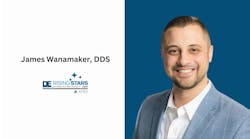Brian Hufford, CPA, CFP
My best friend and mentor, Dr. Jim Pride, stressed that two factors were key to success in the business of dentistry: leadership and management. Leadership is about having a clear vision of the most positive practice outcomes and a plan of action to achieve them. Management is about implementing the best systems and operational processes to support the leadership vision. Jim believed that dentists could only experience happiness in their careers and pursue clinical excellence by mastering leadership and management skills.
These skills are as important as ever, but they have changed significantly in recent years. Since 2008, the area of personal finance or "financial planning" has seen a seismic shift in how dentists approach the leadership and management of their personal financial outcomes. Prior to 2008, the financial environment was a given: ever-increasing prosperity and an emphasis on creating a road map or "plan" to assure that all the bases were touched prior to winning the game at a young age. A financial plan was a sophisticated 20-year projection, adjusted for inflation, which incorporated college expenses, a practice sale, and retirement at age 55. Should we have two, three, or four homes to facilitate sun, skiing, and travel in Europe? Ever-increasing cash flow, with projected growth in dental revenues of between 10%-15% annually, assured that all priorities could be met in the golden era. For some reason, I can't shake the mental image of a giant dentist astride the map of the United States, able to cross from California to New York in a single step. Perhaps it's a good representation of those prosperous times.
Since 2008, my mental image of the external environment is that of a very tiny dentist hiding behind a rock with ants and spiders the size of Air Force One. What I want to see is a normal-sized dentist with normal-sized ants and spiders, and the focus of financial planning being more on leadership and management, not on the environment. What does disciplined advanced planning look like these days? It certainly isn't a 100-page financial plan permanently residing on your bedside table. Dental incomes at the present time are excellent. What is missing is sufficient intent to align current and future financial priorities. This is a leadership issue. Since retirement planning is the primary advanced planning need, allow me to illustrate what leadership and management look like with advanced planning for retirement as a discipline.
Undisciplined advanced planning looks like this:
I have a SIMPLE IRA plan for my office. I am saving for retirement. I can't save more because my kids are in college and I want to get out of debt. I'll retire when I can't work anymore.
Disciplined advanced planning looks like this:
Leadership: I want to be able to retire at age 62, but it's important to me to stay connected to dentistry as long as I can. I want to replace my practice income in retirement, so I need to save more. In fact, my retirement projection states that to replace my working income, I will need to save $74,500 per year until age 62. To stay connected with dentistry, I hope to follow a role-reversal transition model where I identify an associate, realize the value of my practice, and then reverse my role as an associate in the practice. It will likely take three years prior to my retirement date to identify the right associate to accomplish these objectives.
Management: I have asked an actuary to run a pension study that allows me to deduct $74,500 per year. This will save a great deal of income tax; however, even with the tax savings, I am not quite able to find that much to save. My children are in college and I have been rapidly repaying a loan for a large equipment purchase. I have been paying cash to remodel our home. With a small amount of student loans, and by using a little debt for the home remodel, I will actually have more cash than I need to fund my retirement plan. All of the debt will still be gone with slower repayment at age 62. I have identified a transition consultant who will support my desired model at the right time.
Even with the uncertainty that exists in today's economic environment, you can dramatically improve outcomes with demonstrated financial leadership and management. Come out from behind that rock.
Brian Hufford, CPA, CFP, is a wealth advisor and dental practice thought leader with Buckingham Advisors, a national, independent wealth and financial advisory firm with a specialty in helping dentists achieve their most important goals. To connect with Brian and Buckingham, visit BuckinghamAdvisor.com, call (866) 545-8816, or email [email protected].





